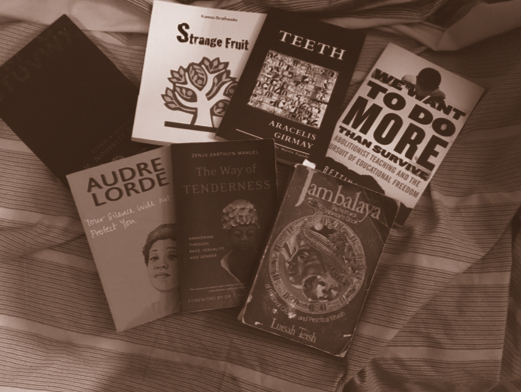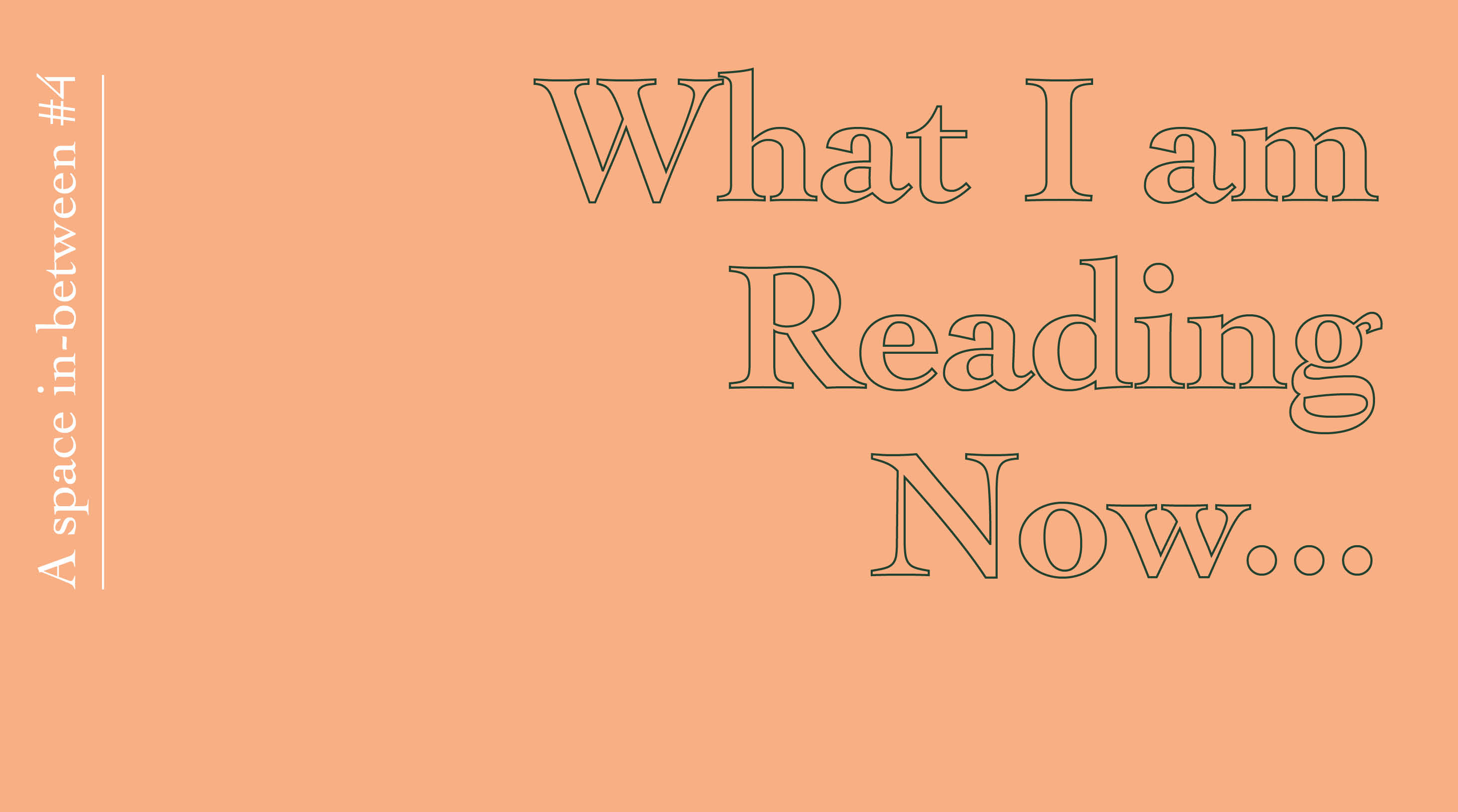What I am Reading Now…
Barby Asante
December 2020
2020 has been a year of reckoning with so much of what we already know. Or should I say, so much of what I already knew. I’ve been speaking this, acting on this, crying about this, losing friends because of this! And I’m meaning literally in the sense of losing both in the death sense and because of the need to let go of the relationships that are no longer working out for us! Because of this I dedicate this ‘what I am reading’ to my dear Sista friends Gail Lewis and Foluke Taylor, as it’s being in study with them over these last hard months that has brought me through the anxiety, fear, grief, anger, and more.
Notice that I’m not naming the this! Because when I read with my Sista’s Gail and Foluke, we do not need to name the things that are weighing heavy on our hearts. The things that we have witnessed almost every day of our living. The things that exasperate us and take our breath away, and not in the way that is associated with pleasure. I am talking about the moments when it is difficult to catch our breath. When we are in the grief, we breathe together and we read together. We come together to hear, embody and produce the comfort that words can bring. In this togetherness we have witnessed each other, held each other, shared moments of joy and wonder. We have soothed our souls with sharing our reading. Reading silently and alone or loudly and together. We draw inspiration from Tonika Sealy and Stefano Harney’s essay Ground Provisions (Afterall: A Journal of Art and Context, March 2018). Reading becomes our refuge as we re-assess the things we can do together. Reading becoming our way of studying our togetherness.
I still attempt to dream, and I do this in remembrance of the words of our Lorde, reading and rereading Poetry is Not A Luxury. Remembering that poetry “…forms the quality of the light within which we predicate our hopes and dreams toward survival and change, first made into language, then into idea, then into more tangible action”. To aid this dreaming in the midst of all this, I reach for the words of Kamau Brathwaite, Aracelis Girmay, Ross Gay and Alice Walker, as this poetry, these words, are as life is. Not a luxury, not in this time. Poetry holds so much of what I cannot say. As the wonderful programme organised by Dawn Lundy Martin and Angie Cruz from the Centre for African American Poetry and Poetics at the University of Pittsburgh entitled Collective, Protest and Rebellion: A Black Study Intensive, gave us in exploring the power of the ways Black people have used language to sooth our grief and succour our celebration. Exploring how Black poetics is as broad and wide as the written, the spoken word, the broken word, music, images, film, dance, our joy and how eloquently poetry evidences our collective grief.
And when there was no way for us to come together on the streets of Notting Hill at the end of August, Gail, Foluke and I pulled together a recorded collective reading of M NourbeSe Philip’s Caribana: African Roots and Continuities (1996), to remember all the Totoben’s and Maise’s stuck, struck and unable to take the movement of our collective histories to the streets to;
sweat and jostle and
jostle and push
jostle and jostle
push and jostle and
and shove and move
To at least shake off some of the grief that 2020 been throwing at us, and to be moving with the spirits of all the Totoben’s and Maise’s who came before and those that we will pave the way for the future in the keeping of the “Marse”. (Thank you to Paul Goodwin, Anthony Joseph, Rambysayi Marafu and Felix Taylor for making this with us and to the South London Gallery, Amal Alhaag, Dipsaus Podcast and the wonderful M. NourbeSe Philip’s for support of this reading).
And how one might vision some way out of this I have been in a collective study of abolition with Black Abolitionist Futures convened by Imani Robinson. Expanding our conversation from Angela Davis’s Are Prison’s Obsolete (2003) as we imagine what some may see as impossible and bring the hopes and dream of a world without prisons into being. As a student of abolition, reading with others, assessing our relationships to harm and how the carceral impacts every area of our lives, I especially think about what abolition can offer to the arts and education. Bettina L. Love’s We Want to Do More Than Survive: Abolitionist Teaching and the Pursuit of Educational Freedom (2019) gives insight from her experience of working in and teaching in schools with Black children, exploring how to bring self-determination and imagination to education, as part of dreaming the liberatory future without harm.
Last but really not at all least, I’m also exploring what spirit might have to offer in visioning something different. I have been communing with my ancestors, by way of ritual and revisiting the work of teacher, dancer, storyteller and high priestess, Lusiah Teish. And I will close this offering with the wonderful and personal book by Zenju Earthlyn Manuel, The Way of Tenderness: Awakening Through Race, Sexuality and Gender (2015), a book that brings tenderness to trauma, reminds us that our embodied experiences should not be bypassed in pursuit of spirit and making the case that race, gender and sexuality are key elements in all of our spiritual awakenings.
Barby Asante is a London based artist, curator & educator. Barby’s work explores legacies of slavery and colonialism in the embodied memories of Black and people of colour, through performative processes that include study, collective actions and rituals, that excavate, unearth and interrogate the given narratives. Her on going project Declaration of Independence (2017- onwards) has been presented at the Diaspora Pavilion, Venice, Feminist Emergencies, Birkbeck, University of London, Body Politics, Troppenmuesum, Amsterdam, Library of Performing Rights, LADA, Relating Narratives: A Common World of Women, Horse Hospital, BALTIC Gateshead and Bergen Kunsthall. The project has taken the form of performances, rituals, sound pieces, installations and an upcoming podcast series.
Barby Asante, Gail Lewis and Foluke Taylor will be joining M. NourbeSe Philip and many others for the annual durational collective reading of NourbeSe’s extended poem Zong! Which re-collects the story of the 130 enslaved Africans thrown overboard a slave ship in 1781. Using the words of the case report, this reading in echo, chant, moan, cries, shouts and hollers will be held on the anniversary of the Zong massacre beginning November 30th 2020 and will run for 10 days.
Reading
Ground Provisions, Tonika Sealy and Stefano Harney (Afterall: A Journal of Art and Context, March 2018)
Poetry is Not A Luxury in Your Silence Will Not Protect You: Essays and Poems, Audre Lorde (Silver Press, 2017)
Caribana: African Roots and Continuities, M NourbeSe Philip (Poui Publications, 1996)
Are Prison’s Obsolete, Angela Davis (SEVEN STORIES PRESS, 2003)
We Want to Do More Than Survive: Abolitionist Teaching and the Pursuit of Educational Freedom, Bettina L. Love(Beacon Press, 2019)
The Way of Tenderness: Awakening Through Race, Sexuality and Gender, Zenju Earthlyn Manuel, (Wisdom Publications, 2015)

Please note the views published in What I am Reading Now… are personal reflections of the contributors.
These may not necessarily represent the views of the University of Dundee.
———
Previous Issue: Amia Srinivasan, November 2020
Next Issue: Noor Afshan, January 2021
